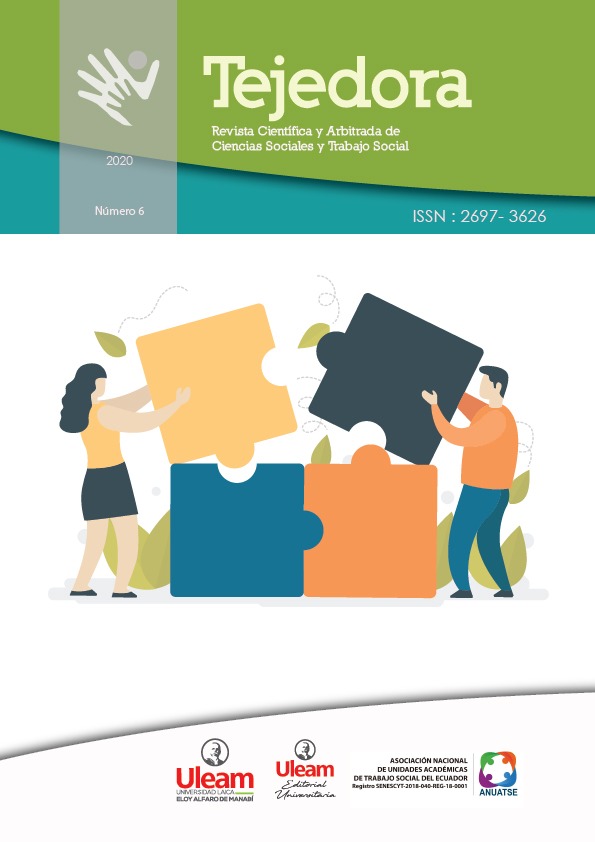Influencers and their impact on teenagers, generation "z"
DOI:
https://doi.org/10.56124/tj.v6i12ep.0109Keywords:
Adolescent, behavior, internet, effective communication, Generation Z, influencersAbstract
Observing the deterioration of interpersonal relationships of adolescents, caused by the excessive use of the internet, the objective of this study was to determine the trends of influencers and their impact on adolescent behavior of Generation Z of Latacunga canton, with the intention of understanding the social and interpersonal processes of young people; based on the hypothesis that the consumption of these contents generated on social platforms impacts the behavior of generation "Z". Therefore, it is analyzed by means of a variable assessment instrument to social networks and the adolescent, TikTokers, YouTubers, Instagramers and internet addictions; as well as family activities and hobbies, affective communication, parental control over internet use. The scope of the work is the impact produced by this audiovisual consumption in the adolescent behavior of generation Z in a canton of the highlands of Ecuador.
Consequently, it is determined thanks to the instruments applied that the trends set by influencers become role models, because the followers have behavioral disorders, being digital natives, they seek immediacy in what they consume or like, so they are influenced by what they consider fashionable, This creates a problem due to the uncontrolled consumption of informal productions on social platforms that they later imitate without caution, directly affecting their family environment, which leads them to isolation and social isolation, encouraging individualism and including the personal aspect and self-identity that adolescents develop at this stage of their lives.
Downloads
References
Álvarez-de-Sotomayor, I. D., Carril, P. C. M., & Sanmamed, M. G. (2022). ¿ Para qué usan Internet los adolescentes?. RIITE Revista Interuniversitaria de Investigación en Tecnología Educativa, 127-140.
Arab, L. E., & Díaz, G. A. (2015). Impacto de las redes sociales e internet en la adolescencia: aspectos positivos y negativos. Revista Médica Clínica Las Condes, 26(1), 7-13.
Castillo-Abdul, B., Romero-Rodríguez, L. M., & Balseca, J. (2021). Hola Followers! Content Analysis of YouTube Channels of Female Fashion Influencers in Spain and Ecuador. SAGE Open. https://doi.org/10.1177/21582440211056609https://bit.ly/3soz94H
Del Prete, A., & Redon Pantoja, S. (2020). Las redes sociales on-line: Espacios de socialización y definición de identidad. Psicoperspectivas, 19(1), 86-96. https://bit.ly/3iYJUpL
Echeburúa, E. (2012). Factores de riesgo y factores de protección en la adicción a las nuevas tecnologías y redes sociales en jóvenes y adolescentes. Revista Española de Drogodependencias, 37(4), 435-448
Echeburúa, E. y Requesens, A. (2012). Adicción a las redes sociales y a las nuevas tecnologías en jóvenes y adolescentes. Guía para educadores. Madrid: Pirámide.
Gangadharbatla, H. (2009). Individual differences in social networking site adoption. In Social networking communities and e-dating services: Concepts and implications (pp. 1-17). IGI Global. https://bit.ly/3vGZH3r
Gil-Quintana J., Malvasi V., Castillo-Abdul B., Romero-Rodríguez L. M. (2020). Learning leaders: Teachers or YouTubers? Participatory culture and STEM competencies in Italian secondary school students. Sustainability, 12(18), 7466. https://doi.org/10.3390/su12187466
Hernandez, C., Fernandez, C. and Baptista, P. (1997), Metodología de la investigación. Colombia. ISBN 968-422-931-3
Jiménez, A. G. (2011). Una perspectiva sobre los riesgos y usos de Internet en la adolescencia. Revista ICONO 14. Revista científica de Comunicación y Tecnologías emergentes, 9(3), 410-425.
Jiménez-Iglesias, E., Martínez-Fernández, G., & Garmendia-Larrañaga, M. (2020). Usos, conflictos y certezas. Riesgos, amenazas, oportunidades y retos de las familias españolas en internet. In Journal: Congreso Internacional de la Asociación Española de Investigación de la Comunicación (pp. 155-166). https://bit.ly/3lEyLfv
Lago García, C. (2022). Influencia de las redes sociales en la desensibilización a la violencia en adultos jóvenes. https://bit.ly/3RBD9d6
Márquez, Israel; Ardèvol, Elisenda (2017). "Hegemonía y contrahegemonía en el fenómeno youtuber". Desacatos. Revista de antropología social, n.º 56, p. 34–49.
Masanet, MJ, Márquez, I., & Pires, F. (2020). Teens and digital image creation on social
media: informal learning, transmedia skills and professional profiles. https://bit.ly/3lFyRUk
Mentinno. (Ed.) (2021). Estado Digital Ecuador Actualización Julio 2021. https://bit.ly/3yC1VTn
Nielsen. (2016). Social Media Report. https://bit.ly/3MmVNTe
Nelson D. W., Moore M. M., Swanson K. K. (2019). Fashion and social networking: A motivations framework. Journal of Fashion Marketing and Management, 23(4), 608 627. https://doi.org/10.1108/jfmm-03-2018-0037
Pariapaza, F., & Isamar, R. (2020). Asociación entre adicción a internet y función familiar en adolescentes cibernautas del cercado de Arequipa, febrero 2020. https://bit.ly/3BEbVu8
Safdie, C. F. (2022). Terapia cognitivo-conductual en el tratamiento de la adicción a internet y redes sociales en adolescentes (Doctoral dissertation, Universidad de Belgrano-Facultad de Humanidades-Licenciatura en Psicología).
Sautu, R., Boniolo, P., Dalle, P., & Elbert, R. (2005). Manual de metodología: construcción del marco teórico, formulación de los objetivos y elección de la metodología.
Torres Basilio, C. L. (2021). Adicción al internet y agresión en estudiantes de secundaria de dos instituciones educativas de Villa El Salvador. https://hdl.handle.net/20.500.13067/1447
UNIR (2020). Influencers en Universidad Internacional de la Rioja. Social Media Marketing. (pp. 4-33).
Ynoub, R. (2020). Epistemología y metodología en y de la investigación en Diseño. Cuadernos del Centro de Estudios en Diseño y Comunicación. Ensayos, (82), 17-31.
Published
How to Cite
Issue
Section
License
Copyright (c) 2024 Revista Científica y Arbitrada de Ciencias Sociales y Trabajo Social: Tejedora. ISSN: 2697-3626

This work is licensed under a Creative Commons Attribution-NonCommercial-ShareAlike 4.0 International License.






















